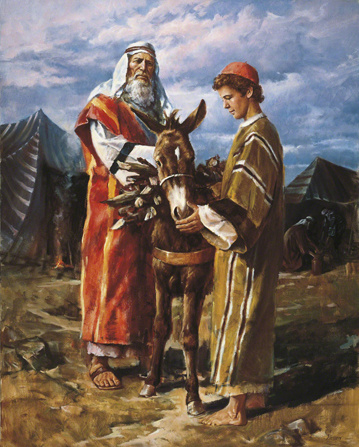Best day of class yet. Brother Satterfield jumps into the doctrine of Abraham. The discussion was so involved I couldn't take notes, so here are some highlights:

- *As discussed previously, Abraham's offering of Isaac was more than just a commandment to kill his most loved son. Abraham knew full well that the Lord intended for him to take his son and literally butcher him, divide his body parts and fat, and then consume him on the altar. The word in Hebrew is Olah, which means to cause to go up. There would have been nothing left of Isaac since he would have gone up in smoke and ash to God. Abraham knew all this is what God was asking of him.
- *Abraham got up early the next day to commence the three day journey. He was eager to serve the Lord, but must have walked in absolute disgust (not the best word... remorse, melancholy, terror, horror, depression??)
- *Genesis 22:2-4 says "go to the land I will show you and 'olah an olah'". That means "go up and cause to go up". This is common Hebrew talk, to take a verb and turn it into a noun. Other examples include for example Lehi who said "I have dreamed a dream" (I have verbed a noun, same word), "or in other words, I have seen a vision (or I have seen a seen... same word).
- *The best part of the lesson for me was when the class was over, I went up and asked him a follow up question. I have loved the scripture Abraham 1:2-3 for a long time and wanted him to connect the two scriptures together. He did... He explained it something like this: Abraham was living in a land of heathon's and had attained the lower gospel from someone, somehow - meaning he was baptized and may have attained the lesser priesthood. Then he sensed there was something greater to be had and longed for it, the Lord led him to a strange land and ultimately to Melchizedek, where he attained the higher priesthood and higher laws and ordinances he so desperately sought.
- *He then explained the power of Abraham's covenant with God, how diligent he was to the Lord, and how his righteous faithfulness had placed God in a position to honor His part of the covenant to feel after Abraham's posterity, and reclaim them. God is bound to do this because of Abraham's faithfulness. This concept is prominently declared on the Title Page of the Book of Mormon, where it says "Which is to show unto the remnant of the house of Israel what great things the Lord hath done for their fathers; and that they may know the covenants of the Lord, that they are not cast off forever". I loved hearing this! It made me rejoice in Abraham's faithfulness, and made me want to do my part to fulfill this covenant.
- *Lastly, he spoke of the return of Elijah in this dispensation and the important event that was in fulfilling the Abrahamic covenant, I suppose in part to turn our hearts to the Abrahamic Covenant, but also in providing ordinances of exaltation.
- This discussion really moved me today. As I write this two days later, I'm exploring everything I can get my hands on related to Abraham and am really overwhelmed by what an amazing person he was and what a special role he plays in the Plan of Salvation. I may need to make a blog post on this stuff soon!

Your few notes here have helped to explain the Abrahamic Covenant to me in more detail than snytjing else I have read or heard of. Thank you.
ReplyDelete